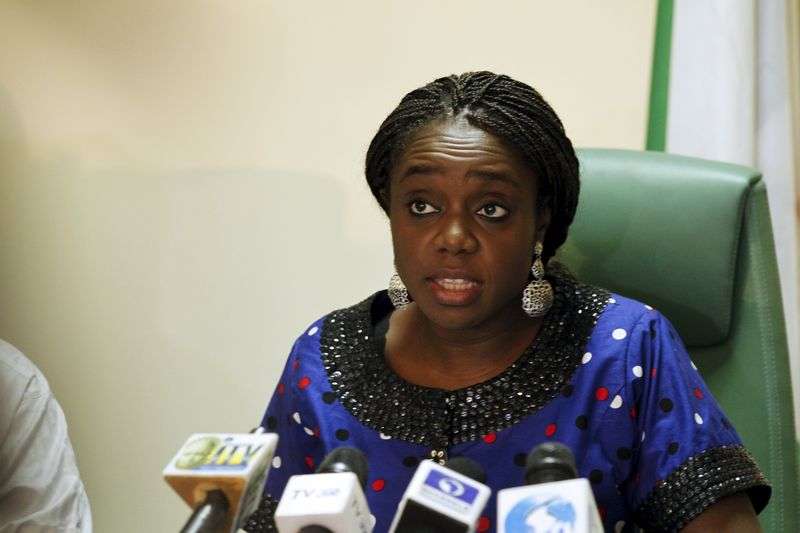- FG to Name and Shame Tax Defaulters
The Minister of Finance, Mrs. Kemi Adeosun, yesterday said the federal government might adopt name-and-shame strategy to expose tax defaulters in the country, just as she decried the fact that only 13 million persons pay tax in Nigeria.
According to Adeosun, out of the 13 million taxpayers, 12.5 per cent are those who pay Pay-As-You-Earn (PAYE).
Adeosun said this while addressing journalists at end of the IMF/World Bank spring meetings in Washington DC.
The Nigerian delegation at the meetings included the Central Bank of Nigeria (CBN) Governor, Mr. Godwin Emefiele, the Minister of Budget and National Planning, Senator Udoma Udo Udoma, Minister of Power, Works and Housing, Babatunde Raji Fashola and nine National Assembly members.
Adeosun however, said the government does not intend to introduce new taxes, saying the government would in the coming days enforce compliance aggressively.
“We have about 13 million tax payers in Nigeria and about 12.5 millions are those who have their taxes deducted. Are we saying all the wealth and self-employed are only 500,000? This is not possible. We are going to be more aggressive on tax collection. We are not witch hunting anybody but because we have to redistribute income from the higher to the lower. Those who have been able to get away with it over the years know that the game is up.
“The job of the government is to ensure that it is very difficult to evade tax, we’ve already stated that job. We are gathering data and statistics of over 800,000 companies have been gathered and registered. How was that done? We simply went to the Corporate Affairs Commission (CAC).
“Nobody wants to pay tax, so we are going to make it more difficult for people to evade taxes. At every data point of government, we would be picking up data to compare tax. The other thing is there is going to be much more better cooperation from the international community and that is one of the things we have been discussing here in Washington, because a lot of money has left Nigeria,” she explained.
But, the minister said moral suasion would also be used in the process of tax enforcement.
Responding to a question on the huge amount of funds recovered by the Economic and Financial Crime Commission (EFCC) in the last two years, the minister said a central recovery account had been created. Adeosun emphasised that the government was keeping its “eyes on the recoveries.”
According to her, “All the recovered monies go into the recovery account which we reconcile. Now, in the budget, there was the provision that some recovered monies would go into it and that goes into specific projects in the budget and any excess recoveries we have to wait and take some decisions.
“So far, we have not recovered up to the amount we are expecting in the budget. But what we are trying to do is to make sure that there are controls. That was why we created a central recovery account.
“What we also discovered is that so many agencies are recovering and we must keep and eyes on those recoveries, otherwise there is the risk of re-looting.
“So all the agencies that recover send us their returns monthly, we then sweep it into a central account which is kept by the accountant general, so that we can reconcile,” she said.
Furthermore, Adeosun said the meeting on the power sector recovery plan was positive.
“The multilateral agencies have looked at the plan we have put together and they liked it because, as they said — it is realistic. We have really dimensioned all the issues from the Gencos to Discos, to end users, to metering,and one thing that everybody is very clear of, is that it is a big problem.
“So it is a large problem that will take some time to solve, but the most important thing is that there are milestones of what we are expecting to see. The multilateral agencies have pledged their support financially, becauuse those investments are tied to certain results.”
From the impression I got yesterday from those meetings, they were optimistic that if we actually implement what we have planned, and the Minister of Works and Housing was very emphatic that he is going to drive the implementation. I feel quite optimistic that it is realistic.
“We are not saying throw away your generator by December, it is a realistic plan, but it is going to take time. If we have power, a lot of factories that have closed down can re-open. So, it ties with our Economic and Recovery Growth Plan,” she added.
According to Adeosun, the World Bank is also going to provide finance for small businesses run by women in Nigeria.
Report by Kunle Aderinokun, Obinna Chima, Funke Olaode, Kasie Abone and Nosa Alekhuogie, in Washington DC.

 Forex3 weeks ago
Forex3 weeks ago
 Naira2 weeks ago
Naira2 weeks ago
 Billionaire Watch2 weeks ago
Billionaire Watch2 weeks ago



 Naira3 weeks ago
Naira3 weeks ago






 Naira2 weeks ago
Naira2 weeks ago




 Naira1 week ago
Naira1 week ago




 Naira4 weeks ago
Naira4 weeks ago






 Naira1 week ago
Naira1 week ago
























